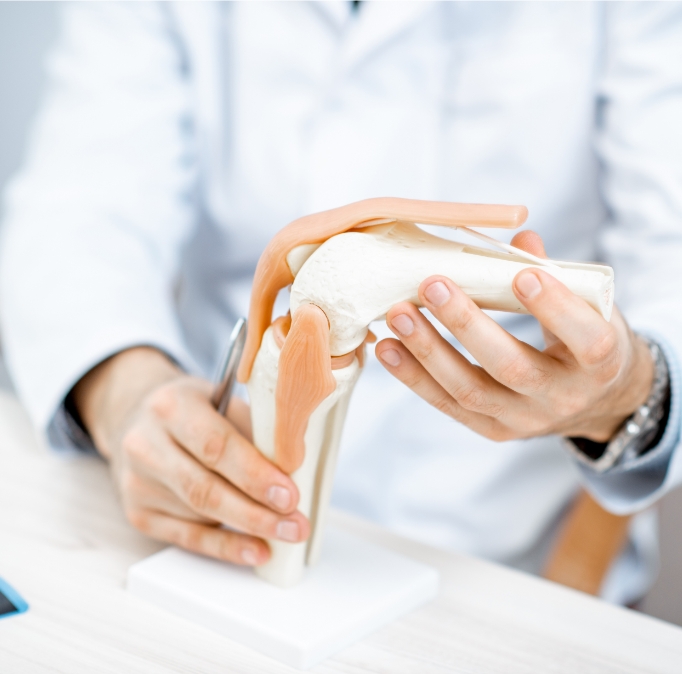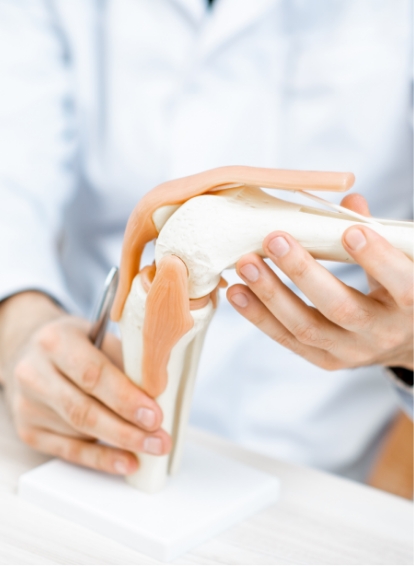Sports & Non-Surgical Orthopaedic Treatments
Plantar Fasciitis
Plantar fasciitis is a common condition that causes sharp pain in the heel and arch of the foot, especially with the first steps in the morning or after periods of rest. This condition arises when the plantar fascia—a thick band of tissue connecting the heel bone to the toes—becomes inflamed or irritated.
At The Clinica, our specialists in Sports & Non-Surgical Orthopaedics provide targeted treatments to manage plantar fasciitis, helping patients relieve pain, reduce inflammation, and restore mobility to lead an active, pain-free life.

What is it?
Plantar fasciitis is an inflammatory condition that affects the plantar fascia, the tissue that runs along the bottom of the foot and supports the arch. This tissue absorbs shock and helps maintain the foot's structure, but excessive strain or repetitive stress can lead to small tears, resulting in inflammation and pain. The condition is often characterised by a stabbing pain in the heel that is worse in the morning or after periods of inactivity.
This pain gradually decreases with movement but may return after long periods of standing, walking, or exercising. Plantar fasciitis is commonly seen in runners, people who are overweight, and those who wear shoes with inadequate support. While it is one of the most common causes of heel pain, plantar fasciitis can affect individuals of all ages and activity levels.
If left untreated, plantar fasciitis can worsen over time, leading to chronic pain and altering one’s walking pattern, which may strain other areas, such as the knees, hips, or back. Prompt treatment is essential to managing symptoms effectively and preventing further complications.
Book an appointment
Additional Information

Causes of the condition
The main cause of plantar fasciitis is repetitive strain on the plantar fascia, which can result from prolonged standing, high-impact activities, or wearing shoes that lack proper arch support. Activities that place a lot of stress on the heel, such as running, dancing, or playing sports on hard surfaces, can contribute to the condition by causing micro-tears in the tissue.
Certain factors increase the risk of developing plantar fasciitis, including being overweight, which places extra stress on the plantar fascia, and having a high or low arch, both of which can lead to improper weight distribution across the foot. Age is also a factor, as plantar fasciitis is more common in middle-aged adults, although it can affect younger people, especially athletes.
Biomechanical issues, such as tight calf muscles or Achilles tendons, can also strain the plantar fascia. Poor posture, abnormal foot alignment, or wearing unsupportive footwear can further exacerbate the risk, making plantar fasciitis a condition influenced by multiple interconnected factors.
Tests that can Be done to confirm the condition
Diagnosing plantar fasciitis typically involves a physical examination, where the clinician will assess the foot and heel for tenderness, swelling, and pain when pressure is applied. The specialist may ask about your daily activities, footwear, and any recent changes in physical routine to determine possible causes of the pain. Observing how the patient walks and stands can also provide insights into potential biomechanical factors.
Imaging tests, such as X-rays or ultrasound, are sometimes used to confirm the diagnosis and rule out other conditions. While X-rays do not reveal soft tissue, they can help identify bone spurs near the heel, which may contribute to heel pain. Ultrasound is effective in visualising the plantar fascia, helping to detect signs of thickening or inflammation. In rare cases, an MRI may be used to assess severe or persistent pain and to exclude other potential causes.
Effective treatments
Treatment for plantar fasciitis aims to relieve pain, reduce inflammation, and support the healing of the plantar fascia. Initial treatments typically involve rest, ice application, and activity modification to alleviate pain. Avoiding high-impact activities that place stress on the foot, such as running or jumping, can help reduce strain on the plantar fascia.
Physical therapy is an essential part of plantar fasciitis management, focusing on stretching exercises for the Achilles tendon and calf muscles to relieve tension on the plantar fascia. Strengthening exercises for the foot and ankle help improve stability and support, making the foot less susceptible to strain. Orthotic devices, such as arch supports or heel cups, can also be beneficial in providing additional support and cushioning.
In some cases, non-surgical treatments like corticosteroid injections may be recommended to reduce inflammation and provide temporary pain relief. Shockwave therapy, which uses sound waves to stimulate blood flow and promote healing, has proven effective for plantar fasciitis, especially for chronic cases. If conservative treatments do not provide relief, minimally invasive procedures may be considered as a last resort.
Book an appointment for an initial consultation
Booking an initial consultation at The Clinica is the first step in effectively managing plantar fasciitis. During this appointment, our specialist will conduct a comprehensive assessment, review your medical history, and discuss your symptoms to determine potential contributing factors. A physical examination of the foot will help pinpoint the exact location of pain and evaluate the severity of the condition.
If necessary, imaging tests will be arranged to confirm the diagnosis and assess any structural abnormalities. Based on the findings, a personalised treatment plan will be developed to relieve pain, improve function, and support a full recovery, enabling you to regain mobility and return to your activities comfortably.
Frequently Asked Questions
Recovery time varies depending on the severity of the condition and adherence to the treatment plan. Mild cases may improve within weeks, while chronic cases may take several months.
In some cases, plantar fasciitis may improve with rest and proper footwear. However, professional treatment is often recommended to achieve full recovery and prevent recurrence.
Orthotics, such as arch supports, can provide additional support and relieve pressure on the plantar fascia. They are often recommended as part of a broader treatment plan.
High-impact activities should be avoided to prevent further strain on the plantar fascia. Low-impact exercises, such as swimming or cycling, are generally safe.
Yes, shockwave therapy is effective for chronic cases of plantar fasciitis. It stimulates healing by increasing blood flow to the affected area and can provide long-term relief.
Specialised Clinics
General Enquiries
Please send your enquiry to us and our Practice Manager will be in touch shortly. Alternatively, if you would rather speak to us or your enquiry requires our urgent attention, please call us on 01344 946363.








